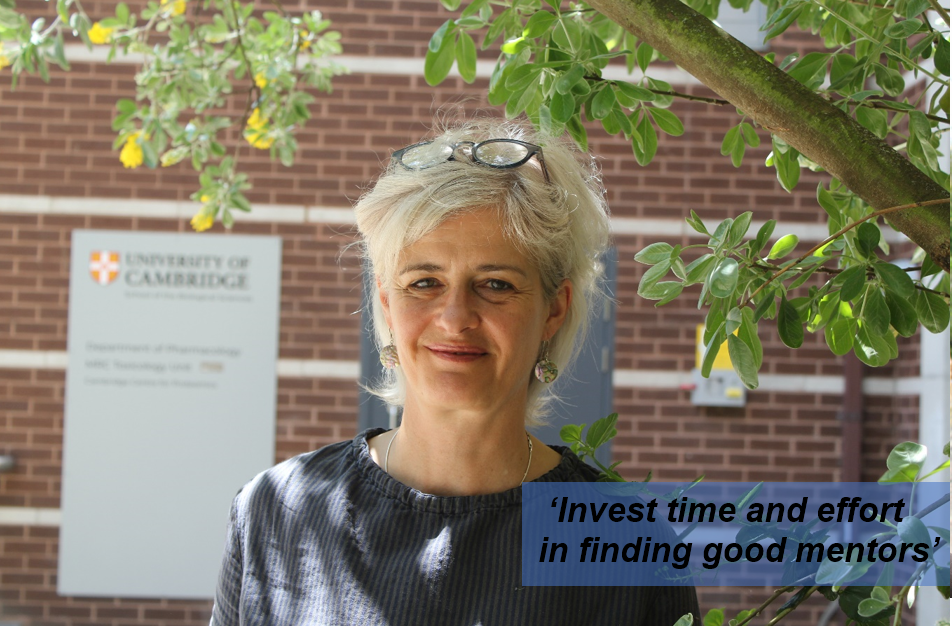An Interview with Dr Catherine Lindon
Dr Catherine Lindon is a lecturer in the Department of Pharmacology and a Fellow, Tutor, and Director of Studies at Newnham College. Cath completed her Ph.D. at the University of London and postdoctoral studies at the Pasteur Institute in Paris.
She was awarded a highly sought after Wellcome Trust Advanced Training Fellowship followed by an equally competitive MRC Career Development Award, which she held first at the Gurdon Institute in Cambridge before becoming a research group leader in the Department of Genetics. Cath joined us at the Department of Pharmacology in 2015.
Who are you & what do you work on?
My name is Cath Lindon and I’m a molecular cell biologist. Research in my lab is focused on ubiquitin signalling: we study how it controls protein destruction (proteolysis) and how proteolysis regulates the cell cycle. Our newest projects aim to harness ubiquitin signalling to create new therapeutic strategies.
What do you love about your job?
That each day is different. With endless opportunity for discovery and for sharing new ideas.
How/why did your research lead you to Cambridge?
I returned to the UK after a great postdoctoral experience at the Pasteur Institute in Paris. Whilst working on cell fate determination in myoblasts I’d become very interested in proteolysis linked to the cell cycle - and frustrated by the lack of techniques for studying this critical cellular process. Jonathon Pines was then at the Gurdon Institute in Cambridge pioneering the use of GFP-tagging to study mitotic proteolysis in living cells, and the opportunity to move to his lab was too good to miss! I later set up a lab in the Department of Genetics as an early career fellow and in 2015 was appointed to a position in the Department of Pharmacology.
Other than science what is most important for you in life?
Science-free weekends with family & friends.
Do you have any advice to early-career women scientists?
Invest time and effort in finding good mentors, good collaborators and good PhD students - those are the relationships that make the job so worthwhile.
Take confidence from your strengths and treat failure as a learning opportunity.
Did you have to face any hurdles as a woman in science?
Of course. The hurdle I face as a woman in science lies in trying to align my values with what is still an overwhelmingly male-defined model of success.
What/who sparked your interest in Science?
Inspirational women science teachers. My interest in biology grew from a fascination with the process of evolution sparked by my school’s ancient collection of fluid-preserved biological specimens (at the time, still used for lessons in phylogeny).
When did you decide to become a research scientist?
I didn’t – and I’m amazed that most scientists are able to answer this question – since the career path is so uncertain. On the contrary I had decided after my PhD that research was probably not for me. I was tempted back to the lab as an escape from full-time parenting and nanny duties and as a postdoc fell into a supportive research community where I discovered the excitement of pursuing old and new questions in cell biology. After that I always followed the most interesting opportunity to pursue my research questions.
What and when was the last experiment you did in the lab?
I ran some blots for a manuscript revision about five years ago. I regret that I’m now a nuisance in the lab (because I can’t find anything I need without help). Kind lab members sometimes let me look at their slides down the microscope for assistance in scoring phenotypes – does that count?
If you were to choose a laboratory superpower what would it be?
Reading a whole paper in the time it takes me now to scan the abstract (and so finally clearing my permanent backlog of open browser tabs…)
How do you relax?
On the water and out of reach of emails – I keep a traditional gaff-rigged sailing yacht on the Norfolk Broads that does the job very nicely.
How do you want to be remembered?
For the support I’ve given to students and mentees on their way through Cambridge - in particular I hope the PhD students who’ve passed through the lab will keep fond memories of their journey!

